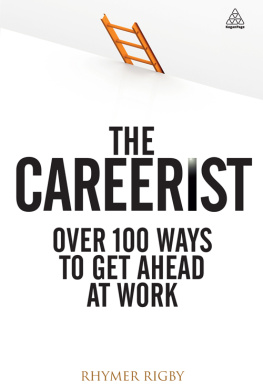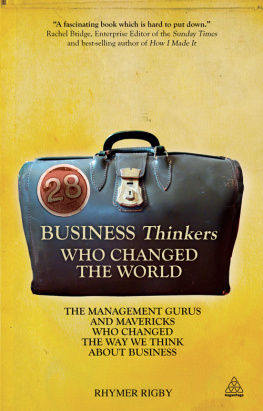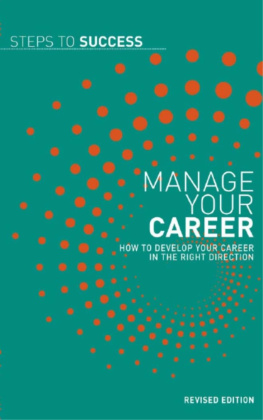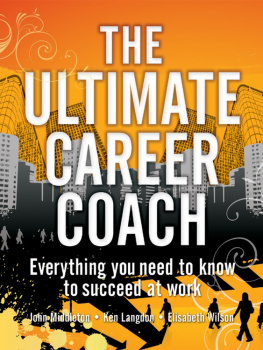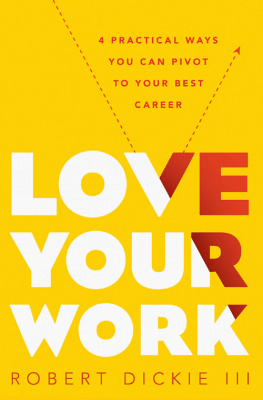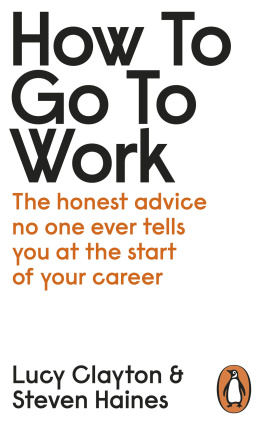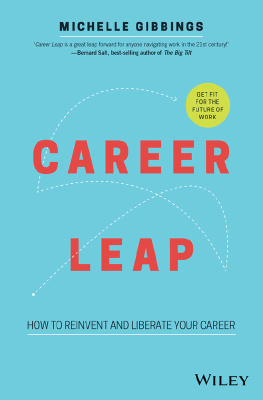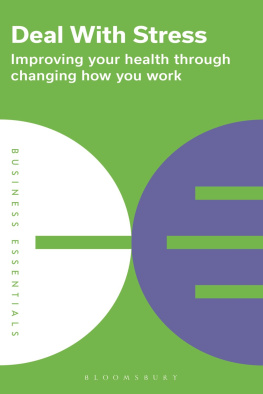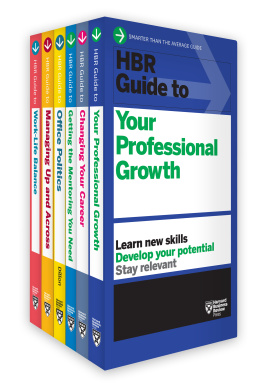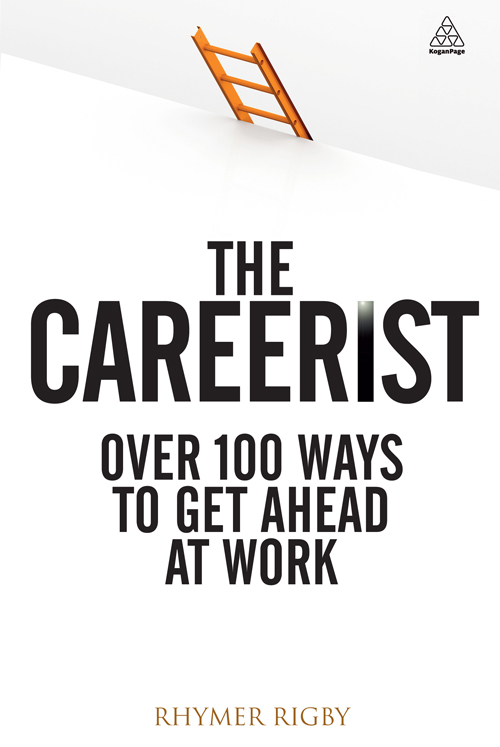Note on the Ebook Edition
For an optimal reading experience, please view large tables and figures in landscape mode. |
This ebook published in 2012 by
Kogan Page Limited
120 Pentonville Road
London N1 9JN
UK
www.koganpage.com
Rhymer Rigby, 2012
E-ISBN 9780749465933
Contents
I d like to thank all the people who spoke to me, many on several occasions, for The Careerist columns in the Financial Times and whose expertise makes this book what it is.
Id also like to thank the Business Life team at the Financial Times Ravi Mattu, Harriet Arnold and Emma Jacobs. Most of all, though, Id like to thank Gautam Malkani at the FT who edited these columns and in virtually all cases improved on the original.
Finally, Id like to thank my agent, Simon Benham.
W hen you look at writing a weekly column based around a single subject area, one of the first considerations, before you all agree its a goer, is whether you can easily come up with, say, 25 topics or about six months worth of slots. With The Careerist, the FT s Business Life team and I did this and agreed that six months down the line wed see how things were going. That was over two years ago and, even now, when I realistically expected to be scraping the bottom of the barrel, I rarely sit around agonizing over what Im going to write about next week. I had hugely underestimated the natural stock of resources to be found in office life.
With the benefit of hindsight, this was perhaps obvious for a number of reasons. First, most people spend eight hours a day or more at work. More time than they spend with their families, more time than they spend asleep. Selling our time to an employer is, for most of us, our single most significant activity. Not only that, but work is taking up more of our lives, not less. Second, one of the biggest points of work is getting ahead, whether its for straightforward reasons (you want to become CEO) or secondary reasons (you want a bigger house). Third, there are innumerable routes, if not to the very top, then at least upwards. And fourth, not everyone behaves well (as the career coach Blaire Palmer says in the piece in this book dealing with favouritism, We expect organizations to be like a family but theyre often more like the playground). These are just a few reasons and there are doubtless dozens more the thing about the workplace is that all human life is there.
The upshot of this is that most of us deal with dozens of issues and situations every week that could have a bearing on our careers. Some of them are seemingly trivial using humour in the office, drinks with colleagues or going on holiday properly. Others are more obviously serious sacking someone, commanding respect and coming back from your own failures. Some are even strangely abstract such as becoming an iconoclast. What they all share, though, is that, large or small, they offer opportunities to shine or, at the very least, minimize the career damage you suffer when things go wrong. Moreover, in many of these situations the way forward is not entirely obvious and there are plenty of tips and tricks that help you come out ahead.
Perhaps unsurprisingly one of the most enjoyable things about writing this column has been doing the 300-plus interviews that went into this book. Many are with the kind of people youd expect career coaches, business psychologists, headhunters, academics and so on. But others are a little more out there. For instance, there is Robin Jay, Americas foremost expert on the art of business lunch. There is William Hanson, a well known etiquette consultant. There is Joe Navarro, a former FBI agent whos a globally renowned expert on body language. And theres Gerald Ratner, the man who memorably called his products crap on how to bounce back from failure. I am indebted to all these experts who have been kind enough to speak to me over the last two years and let me pick their brains.
As the number of experts whose careers are in areas as diverse as leadership development, personal branding and personal organization doubtless points up, I am not an expert on any single area. And the point of this book is not to provide an exhaustive answer on how to manage under-performers, set career goals or even do a business breakfast. If you look on Amazon or on the business shelves of your local bookstore, youll find whole books devoted to many of the topics which this book covers in 650 words and quite a few of them will have been written by people quoted in this book.
What this book is intended to offer, though, is a kind of gazetteer to the world of work. Worried about making a good first impression or how to conduct an interview? Well, here are the basics. Need to ask someone for help or think youve chosen the wrong job? Here are half a dozen pointers. Realize you dont know how to sack someone or ask for a pay rise? This will provide you with a good grounding. The advice is pithy, useful, to the point and any of the topics can be read in under five minutes. That should be enough to recommend it to anyone who wants to get ahead at work.
Many people have something in their working past that they would rather potential employers didnt know about. But how do you minimize the impact of a black mark on your CV?
What constitutes a blot on my rsum?
There is a whole spectrum, from the very trivial to the very serious. Theres quite a difference between something very serious like fraud or professional misconduct and the guilt-by-association type stuff where youve been working for a company thats collapsed, says Janet Moran, managing director of the CV House. If its the latter, its entirely possible to move on easily.
How should I play it?
Your CV needs to be a fair and accurate representation of you and if it isnt, you can be dismissed, so you must never lie, says Nigel Parslow, UK managing director of the executive search firm Harvey Nash. But a CV is also a marketing tool, so you can expand on the good points and gloss over the bad ones.
Corinne Mills, managing director of Personal Career Management, says: It amazes me how many people draw attention to their shortcomings. They seem to want to announce them out loud. People often supply way too much information.
Examples of this include mentioning that you were made redundant after working somewhere for years or detailing a decades-old poor degree result. But if you are asked about something youve glossed over in an interview, you should play it straight.
Work out the question you would least like to be asked and practise answering it until you have a plausible response that you can deliver confidently, says Miranda Kennett of First Class Coach.
Are all negative experiences negative?
Candidates perceptions of these blots can be far worse than they are, says Ms Moran. People whove been through tough times are often more useful and experienced than those whove only had things go well for them.
When it comes to negative experiences, time is a great amnesiac. If youre in your 50s, no one cares about how you messed around in your early 20s, says Mr Parslow. However, he says multiple blots are harder to dismiss: Everyone can make one mistake, but if you have two in a row, it starts to look like the problem is you.
What about illness?
Ms Mills says that many people feel the compulsion to detail everything about their health, even when it isnt asked for. Especially if it is something thats been resolved, you should take the view that if youre going for the job youre fit to do it and thats that. However, she adds, long periods of illness may need to be explained. In this case, write a covering letter, stressing that its in your past and that you are completely recovered now.

